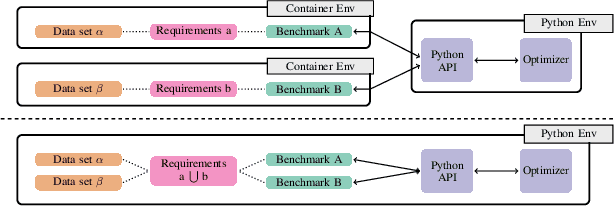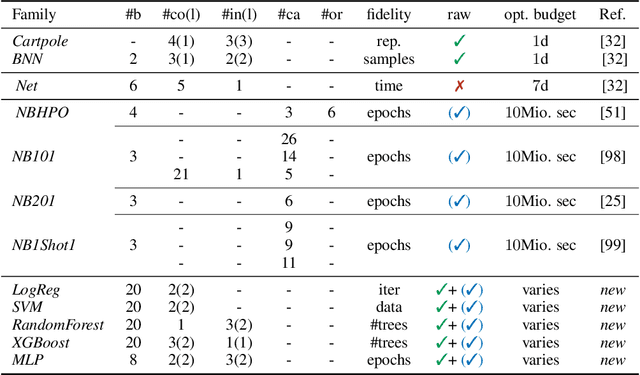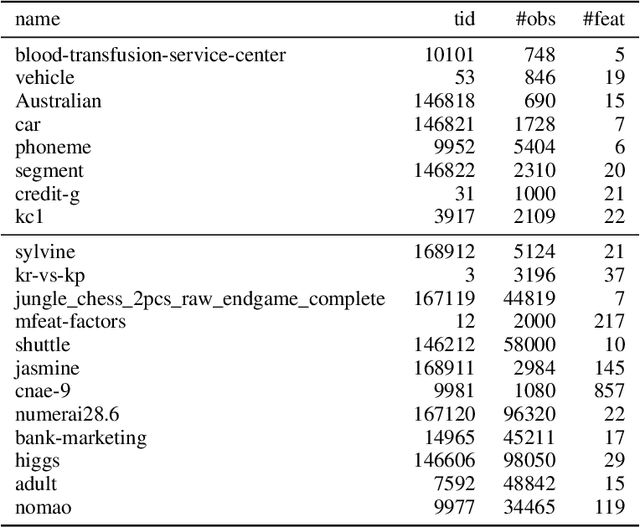Aaron Klein
Where to Begin: Efficient Pretraining via Subnetwork Selection and Distillation
Oct 08, 2025Abstract:Small Language models (SLMs) offer an efficient and accessible alternative to Large Language Models (LLMs), delivering strong performance while using far fewer resources. We introduce a simple and effective framework for pretraining SLMs that brings together three complementary ideas. First, we identify structurally sparse sub-network initializations that consistently outperform randomly initialized models of similar size under the same compute budget. Second, we use evolutionary search to automatically discover high-quality sub-network initializations, providing better starting points for pretraining. Third, we apply knowledge distillation from larger teacher models to speed up training and improve generalization. Together, these components make SLM pretraining substantially more efficient: our best model, discovered using evolutionary search and initialized with LLM weights, matches the validation perplexity of a comparable Pythia SLM while requiring 9.2x fewer pretraining tokens. We release all code and models at https://github.com/whittle-org/whittle/, offering a practical and reproducible path toward cost-efficient small language model development at scale.
Improving LLM-based Global Optimization with Search Space Partitioning
May 27, 2025Abstract:Large Language Models (LLMs) have recently emerged as effective surrogate models and candidate generators within global optimization frameworks for expensive blackbox functions. Despite promising results, LLM-based methods often struggle in high-dimensional search spaces or when lacking domain-specific priors, leading to sparse or uninformative suggestions. To overcome these limitations, we propose HOLLM, a novel global optimization algorithm that enhances LLM-driven sampling by partitioning the search space into promising subregions. Each subregion acts as a ``meta-arm'' selected via a bandit-inspired scoring mechanism that effectively balances exploration and exploitation. Within each selected subregion, an LLM then proposes high-quality candidate points, without any explicit domain knowledge. Empirical evaluation on standard optimization benchmarks shows that HOLLM consistently matches or surpasses leading Bayesian optimization and trust-region methods, while substantially outperforming global LLM-based sampling strategies.
Hyperband-based Bayesian Optimization for Black-box Prompt Selection
Dec 10, 2024



Abstract:Optimal prompt selection is crucial for maximizing large language model (LLM) performance on downstream tasks. As the most powerful models are proprietary and can only be invoked via an API, users often manually refine prompts in a black-box setting by adjusting instructions and few-shot examples until they achieve good performance as measured on a validation set. Recent methods addressing static black-box prompt selection face significant limitations: They often fail to leverage the inherent structure of prompts, treating instructions and few-shot exemplars as a single block of text. Moreover, they often lack query-efficiency by evaluating prompts on all validation instances, or risk sub-optimal selection of a prompt by using random subsets of validation instances. We introduce HbBoPs, a novel Hyperband-based Bayesian optimization method for black-box prompt selection addressing these key limitations. Our approach combines a structural-aware deep kernel Gaussian Process to model prompt performance with Hyperband as a multi-fidelity scheduler to select the number of validation instances for prompt evaluations. The structural-aware modeling approach utilizes separate embeddings for instructions and few-shot exemplars, enhancing the surrogate model's ability to capture prompt performance and predict which prompt to evaluate next in a sample-efficient manner. Together with Hyperband as a multi-fidelity scheduler we further enable query-efficiency by adaptively allocating resources across different fidelity levels, keeping the total number of validation instances prompts are evaluated on low. Extensive evaluation across ten benchmarks and three LLMs demonstrate that HbBoPs outperforms state-of-the-art methods.
Warmstarting for Scaling Language Models
Nov 11, 2024



Abstract:Scaling model sizes to scale performance has worked remarkably well for the current large language models paradigm. The research and empirical findings of various scaling studies led to novel scaling results and laws that guides subsequent research. High training costs for contemporary scales of data and models result in a lack of thorough understanding of how to tune and arrive at such training setups. One direction to ameliorate the cost of pretraining large models is to warmstart the large-scale training from smaller models that are cheaper to tune. In this work, we attempt to understand if the behavior of optimal hyperparameters can be retained under warmstarting for scaling. We explore simple operations that allow the application of theoretically motivated methods of zero-shot transfer of optimal hyperparameters using {\mu}Transfer. We investigate the aspects that contribute to the speedup in convergence and the preservation of stable training dynamics under warmstarting with {\mu}Transfer. We find that shrinking smaller model weights, zero-padding, and perturbing the resulting larger model with scaled initialization from {\mu}P enables effective warmstarting of $\mut{}$.
Hyperparameter Optimization in Machine Learning
Oct 30, 2024



Abstract:Hyperparameters are configuration variables controlling the behavior of machine learning algorithms. They are ubiquitous in machine learning and artificial intelligence and the choice of their values determine the effectiveness of systems based on these technologies. Manual hyperparameter search is often unsatisfactory and becomes unfeasible when the number of hyperparameters is large. Automating the search is an important step towards automating machine learning, freeing researchers and practitioners alike from the burden of finding a good set of hyperparameters by trial and error. In this survey, we present a unified treatment of hyperparameter optimization, providing the reader with examples and insights into the state-of-the-art. We cover the main families of techniques to automate hyperparameter search, often referred to as hyperparameter optimization or tuning, including random and quasi-random search, bandit-, model- and gradient- based approaches. We further discuss extensions, including online, constrained, and multi-objective formulations, touch upon connections with other fields such as meta-learning and neural architecture search, and conclude with open questions and future research directions.
LLM Compression with Neural Architecture Search
Oct 09, 2024



Abstract:Large language models (LLMs) exhibit remarkable reasoning abilities, allowing them to generalize across a wide range of downstream tasks, such as commonsense reasoning or instruction following. However, as LLMs scale, inference costs become increasingly prohibitive, accumulating significantly over their life cycle. This poses the question: Can we compress pre-trained LLMs to meet diverse size and latency requirements? We leverage Neural Architecture Search (NAS) to compress LLMs by pruning structural components, such as attention heads, neurons, and layers, aiming to achieve a Pareto-optimal balance between performance and efficiency. While NAS already achieved promising results on small language models in previous work, in this paper we propose various extensions that allow us to scale to LLMs. Compared to structural pruning baselines, we show that NAS improves performance up to 3.4% on MMLU with an on-device latency speedup.
Structural Pruning of Pre-trained Language Models via Neural Architecture Search
May 03, 2024



Abstract:Pre-trained language models (PLM), for example BERT or RoBERTa, mark the state-of-the-art for natural language understanding task when fine-tuned on labeled data. However, their large size poses challenges in deploying them for inference in real-world applications, due to significant GPU memory requirements and high inference latency. This paper explores neural architecture search (NAS) for structural pruning to find sub-parts of the fine-tuned network that optimally trade-off efficiency, for example in terms of model size or latency, and generalization performance. We also show how we can utilize more recently developed two-stage weight-sharing NAS approaches in this setting to accelerate the search process. Unlike traditional pruning methods with fixed thresholds, we propose to adopt a multi-objective approach that identifies the Pareto optimal set of sub-networks, allowing for a more flexible and automated compression process.
Obeying the Order: Introducing Ordered Transfer Hyperparameter Optimisation
Jun 29, 2023Abstract:We introduce ordered transfer hyperparameter optimisation (OTHPO), a version of transfer learning for hyperparameter optimisation (HPO) where the tasks follow a sequential order. Unlike for state-of-the-art transfer HPO, the assumption is that each task is most correlated to those immediately before it. This matches many deployed settings, where hyperparameters are retuned as more data is collected; for instance tuning a sequence of movie recommendation systems as more movies and ratings are added. We propose a formal definition, outline the differences to related problems and propose a basic OTHPO method that outperforms state-of-the-art transfer HPO. We empirically show the importance of taking order into account using ten benchmarks. The benchmarks are in the setting of gradually accumulating data, and span XGBoost, random forest, approximate k-nearest neighbor, elastic net, support vector machines and a separate real-world motivated optimisation problem. We open source the benchmarks to foster future research on ordered transfer HPO.
Optimizing Hyperparameters with Conformal Quantile Regression
May 05, 2023Abstract:Many state-of-the-art hyperparameter optimization (HPO) algorithms rely on model-based optimizers that learn surrogate models of the target function to guide the search. Gaussian processes are the de facto surrogate model due to their ability to capture uncertainty but they make strong assumptions about the observation noise, which might not be warranted in practice. In this work, we propose to leverage conformalized quantile regression which makes minimal assumptions about the observation noise and, as a result, models the target function in a more realistic and robust fashion which translates to quicker HPO convergence on empirical benchmarks. To apply our method in a multi-fidelity setting, we propose a simple, yet effective, technique that aggregates observed results across different resource levels and outperforms conventional methods across many empirical tasks.
HPOBench: A Collection of Reproducible Multi-Fidelity Benchmark Problems for HPO
Sep 14, 2021



Abstract:To achieve peak predictive performance, hyperparameter optimization (HPO) is a crucial component of machine learning and its applications. Over the last years,the number of efficient algorithms and tools for HPO grew substantially. At the same time, the community is still lacking realistic, diverse, computationally cheap,and standardized benchmarks. This is especially the case for multi-fidelity HPO methods. To close this gap, we propose HPOBench, which includes 7 existing and 5 new benchmark families, with in total more than 100 multi-fidelity benchmark problems. HPOBench allows to run this extendable set of multi-fidelity HPO benchmarks in a reproducible way by isolating and packaging the individual benchmarks in containers. It also provides surrogate and tabular benchmarks for computationally affordable yet statistically sound evaluations. To demonstrate the broad compatibility of HPOBench and its usefulness, we conduct an exemplary large-scale study evaluating 6 well known multi-fidelity HPO tools.
 Add to Chrome
Add to Chrome Add to Firefox
Add to Firefox Add to Edge
Add to Edge